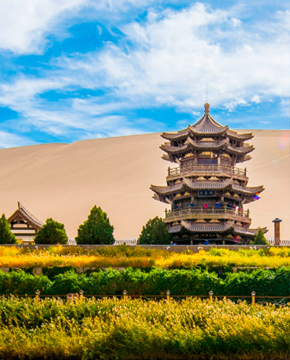The vast land and diverse ethnic cultures of Xinjiang naturally "cook" a great variety of delicious ethnic foods. Tasting the Xinjiang food is not only to satisfy your stomach but a way to know the ethnic cultures in Xinjiang.
As a land with the tradition of animal husbandry production, Xinjiang is rich in sheep and cattle. The staple food of Islamic people is that of mutton and beef. Shish kebab is a popular snack nationwide--found in the streets and markets throughout China.
The barbecued (or roasted) whole lamb is the "king" of Xinjiang cuisine and the highlight of a dinner. It is a match for Beijing's roast duck. The extremely delicious and fragrant barbecued whole lamb, with crisp skin and soft meat, is golden and bright in color. Before dinner, it is placed on a table, and the lamb's head is tied with red-colored silk with flower knots, while its mouth is stuffed with coriander or celery. Small knives are supplied on table. The attendant pushes the diners around the table and the guests can conveniently cut the meat with the small knife. The tourists can have the toasted lamb everywhere in Xinjiang, but the best one is served at bazaars.
Polo, a special Xinjiang cuisine--rice cooked with fresh mutton, carrots, onions, vegetable oil, melted sheep's fat, and raisins and stewed mutton are the favorite food in their daily table. Polo is not only a kind of well-nourishing cuisine, but also a feature of festivals, weddings and funerals. Crispy and tasty roasted nans, samsa, pulled noodles (lamian), oily pyramid (You Ta Zi), Sanzi (deep-fried dough twists) and thin-wrapper steamed stuffed bun (pitimantuo in Uygur) are traditional snacks of ethnic peoples while flour-filled lungs, rice-filled sausages and Kurtaxi are special snacks. Ethnic peoples living in the pasture can produce many kinds of dairy products with milk, sheep milk. Kazaks like smoked horse sausages and horse meat, which are very delicious.
Nan and milk tea are the most popular and staple food. Nan is a daily food for the Uygurs, Kazaks and Tajiks. It is invariable round in shape, but there are about fifty different kinds of nans. The materials mainly include flour and seasonings. Milk tea is a favorite drink for many ethnic minority peoples, especially Kazaks and Mongolians. If you visit to Xinjiang, the hospitable hosts will show their welcome by offering you savory milk tea upon receiving you. Milk tea is such an essential drink that the local peoples would prefer having no food to having no milk tea. Other snacks include roast fish, meat of sheep head, starch-lamb soup (Fentang), Ququ (boiled dumplings), presenting the flavor of Xinjiang food culture.



